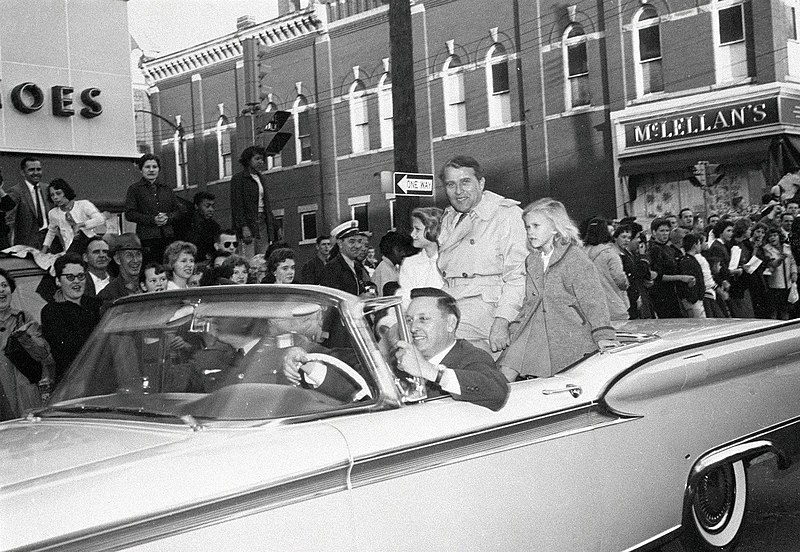In 1969, three astronauts, Neil Armstrong, Buzz Aldrin, and Michael Collins, were sent up to space, with Armstrong and Aldrin making history as the first men on the moon. It took groups of the best scientific minds to make the historic mission happen, and the mastermind behind it all was revealed to be a Nazi scientist.
Following the Second World War, thousands of French and Russian prisoners of war in Nazi Germany worked on the Saturn V rocket that would be used to send the three astronauts up into space. All of them were under orders of Nazi scientist Wernher von Braun, who was an SS officer that had a Ph.D. in engineering and was granted by Adolf Hitler to work on experimental rockets back in the 1930s. The 22-year old Nazi officer handpicked the best scientific German minds as they worked on the rocket in a facility in Peenemunde on the Baltic Sea ISland of Usedom.
Following the war, Von Braun and a team of 118 scientists surrendered to the nearest U.S. troops they found. As Von Braun was in the Allied Forces’ list of German scientists that they wanted to recruit, he was taken to the United States as a pioneer instead of a prisoner of war and was tasked to work on top-secret missions such as Operation Paperclip. He would later tell the Americans that his spearheading of the Nazi rocket program was a way for him to advance scientific knowledge, and shortly after, he rebranded himself as Werner von Braun.
His knowledge and expertise led him to become the person-in-charge of the US ballistic missile program. A year later, when NASA was founded, he was the agency’s top engineer and was tasked to design the Saturn V rocket.
Meanwhile, in an interview with Professor Brian Cox back in 2016, Aldrin shared how the Apollo 11 mission was “well-orchestrated.” Aldrin explained that a lot of the piloting of the spacecraft that they were in was mostly done by the scientists and engineers at mission control. “You’re not piloting anything, you’re along for the ride,” said Aldrin, about the Saturn V rocket launching out of Earth’s orbit.
“Technically, if things did go wrong, there’s a way you could do some steering, nobody has ever done it.”



 NASA Faces Major Workforce Reduction as 20% of Employees Prepare to Leave
NASA Faces Major Workforce Reduction as 20% of Employees Prepare to Leave  Is space worth the cost? Accounting experts say its value can’t be found in spreadsheets
Is space worth the cost? Accounting experts say its value can’t be found in spreadsheets  Astronomers have discovered another puzzling interstellar object − this third one is big, bright and fast
Astronomers have discovered another puzzling interstellar object − this third one is big, bright and fast  Trump Signs Executive Order to Boost AI Research in Childhood Cancer
Trump Signs Executive Order to Boost AI Research in Childhood Cancer  FDA Pilot Program Eases Rules for Nicotine Pouch Makers
FDA Pilot Program Eases Rules for Nicotine Pouch Makers  SpaceX Prioritizes Moon Mission Before Mars as Starship Development Accelerates
SpaceX Prioritizes Moon Mission Before Mars as Starship Development Accelerates  Lost in space: MethaneSat failed just as NZ was to take over mission control – here’s what we need to know now
Lost in space: MethaneSat failed just as NZ was to take over mission control – here’s what we need to know now  SpaceX’s Starship Completes 11th Test Flight, Paving Way for Moon and Mars Missions
SpaceX’s Starship Completes 11th Test Flight, Paving Way for Moon and Mars Missions  Trump Administration to Launch Autism Initiatives Targeting Acetaminophen Use and New Treatment Options
Trump Administration to Launch Autism Initiatives Targeting Acetaminophen Use and New Treatment Options  Neuralink Plans High-Volume Brain Implant Production and Fully Automated Surgery by 2026
Neuralink Plans High-Volume Brain Implant Production and Fully Automated Surgery by 2026  Tabletop particle accelerator could transform medicine and materials science
Tabletop particle accelerator could transform medicine and materials science 































